牛津译林版8B语法知识点汇总
牛津译林版8B语法知识点汇总
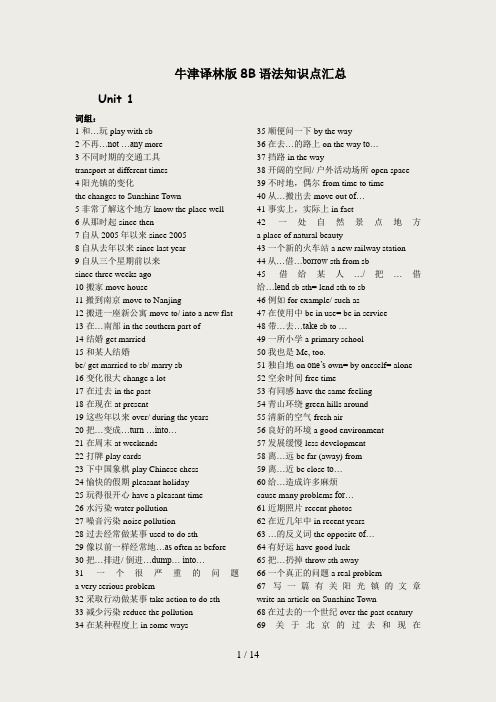
牛津译林版8B语法知识点汇总Unit 1词组:1 和…玩play with sb2 不再…not…any more3 不同时期的交通工具transport at different times4 阳光镇的变化the changes to Sunshine Town5 非常了解这个地方know the place well6 从那时起since then7 自从2005年以来since 20058 自从去年以来since last year9 自从三个星期前以来since three weeks ago10 搬家move house11 搬到南京move to Nanjing12 搬进一座新公寓move to/ into a new flat13 在…南部in the southern part of14 结婚get married15 和某人结婚be/ get married to sb/ marry sb16 变化很大change a lot17 在过去in the past18 在现在at present19 这些年以来over/ during the years20 把…变成…turn…into…21 在周末at weekends22 打牌play cards23 下中国象棋play Chinese chess24 愉快的假期pleasant holiday25 玩得很开心have a pleasant time26 水污染water pollution27 噪音污染noise pollution28 过去经常做某事used to do sth29 像以前一样经常地…as often as before30 把…排进/ 倒进…dump…into…31 一个很严重的问题a very serious problem32 采取行动做某事take action to do sth33 减少污染reduce the pollution34 在某种程度上in some ways 35 顺便问一下by the way36 在去…的路上on the way to…37 挡路in the way38 开阔的空间/ 户外活动场所open space39 不时地,偶尔from time to time40 从…搬出去move out of…41 事实上,实际上in fact42 一处自然景点地方a place of natural beauty43 一个新的火车站a new railway station 44从…借…borrow sth from sb45借给某人…/把…借给…lend sb sth= lend sth to sb46 例如for example/ such as47 在使用中be in use= be in service48 带…去…take sb to …49 一所小学a primary school50 我也是Me, too.51 独自地on one’s own= by oneself= alone52 空余时间free time53 有同感have the same feeling54 青山环绕green hills around55 清新的空气fresh air56 良好的环境a good environment57 发展缓慢less development58 离…远be far (away) from59 离…近be close to…60 给…造成许多麻烦cause many problems for…61 近期照片recent photos62 在近几年中in recent years63 …的反义词the opposite of…64 有好运have good luck65 把…扔掉throw sth away66 一个真正的问题a real problem67 写一篇有关阳光镇的文章write an article on Sunshine Town68在过去的一个世纪over the past century 69关于北京的过去和现在about Beijing’s past and present 70感冒have a cold71 患重感冒have a bad cold72 受到某人的来信hear from sb= receive a letter from73 乘飞机旅行travel by plane/ by air74 享受阳光和沙滩enjoy the sun and the beach语法:现在完成时(I)我们用现在完成时表示从过去持续到现在的动作或状态,或已完成但对现在有一定影响的活动。
译林版牛津英语8B语法点复习
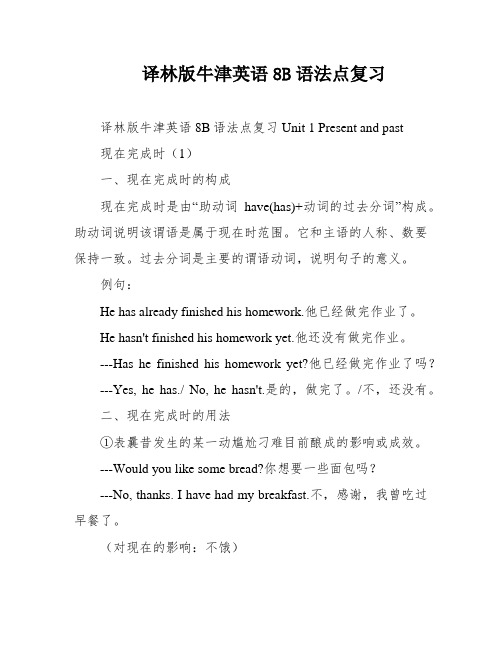
译林版牛津英语8B语法点复习译林版牛津英语8B语法点复习Unit 1 Present and past现在完成时(1)一、现在完成时的构成现在完成时是由“助动词have(has)+动词的过去分词”构成。
助动词说明该谓语是属于现在时范围。
它和主语的人称、数要保持一致。
过去分词是主要的谓语动词,说明句子的意义。
例句:He has already finished his homework.他已经做完作业了。
He hasn't finished his homework yet.他还没有做完作业。
---Has he finished his homework yet?他已经做完作业了吗?---Yes, he has./ No, he hasn't.是的,做完了。
/不,还没有。
二、现在完成时的用法①表曩昔发生的某一动尴尬刁难目前酿成的影响或成效。
---Would you like some bread?你想要一些面包吗?---No, thanks. I have had my breakfast.不,感谢,我曾吃过早餐了。
(对现在的影响:不饿)---Why don't you drive to your office?你为甚么不开车去办公室啊?---Because my car has broken.因为我的车坏了。
(对目前的影响:车没举措开了)①表示从过去开始一直持续到现在,也许还会继续下去的动作或状态。
He has studied English for 6 years.他已经研究英语六年了。
Mary has been busy since she came back from Hangzhou.自从从杭州回来,玛丽一直在忙。
3、常和目前完成时连用的工夫状语①用副词already和yet。
already一般用于一定句中,yet 一般用于否定句和疑问句中。
We have already finished our homework.我们已完成作业了。
牛津译林版英语8BUnit8重点词组语言点归纳
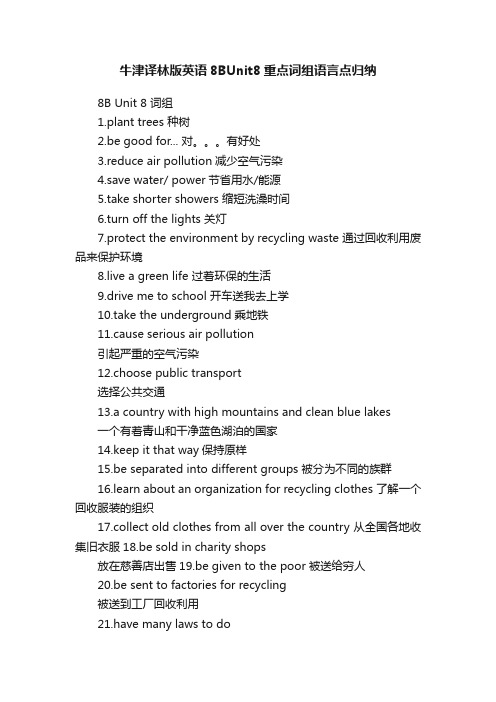
牛津译林版英语8BUnit8重点词组语言点归纳8B Unit 8 词组1.plant trees 种树2.be good for... 对。
有好处3.reduce air pollution减少空气污染4.save water/ power节省用水/能源5.take shorter showers 缩短洗澡时间6.turn off the lights 关灯7.protect the environment by recycling waste 通过回收利用废品来保护环境8.live a green life 过着环保的生活9.drive me to school 开车送我去上学10.take the underground 乘地铁11.cause serious air pollution引起严重的空气污染12.choose public transport选择公共交通13.a country with high mountains and clean blue lakes一个有着青山和干净蓝色湖泊的国家14.keep it that way保持原样15.be separated into different groups 被分为不同的族群16.learn about an organization for recycling clothes 了解一个回收服装的组织17.collect old clothes from all over the country 从全国各地收集旧衣服18.be sold in charity shops放在慈善店出售19.be given to the poor 被送给穷人20.be sent to factories for recycling被送到工厂回收利用21.have many laws to do有许多法律来做某事22.for example 例如23.be not allowed to cut down trees不被允许砍伐树木24.drop litter in a public place在公共场合丢垃圾25.be fined by the police 被警察罚款26.limit air and water pollution 限制空气和水污染27.our greatest treasure我们最大的财富28.depend on 依靠29.rich resources丰富的资源/doc/9d8037936.html,e energy from the sun, wind andwater 使用来自太阳、风和水的能源31.these new types of energy这些新型能源32.cost very little 花费很少33.run out 用完34.produce little pollution几乎不产污染35.World Environment Day 世界环境日36.do ... for the environment37.do something to make a difference做点事情以起到作用38.cause a result 导致一个结果39.be used up 被用完40.do something wrong 做错事41.something used 用过的东西42.so that = in order to=to do sth 为了43.set up 成立44.protect nature 保护自然45.my online friend 我的网友46.keep their country clean47.do with(what) /deal with(how)处理48.sound like a good idea49.in the town square 在小镇广场50.at the town hall 在小镇礼堂51.be invited to the show被邀请到这个展览52.at the show 在演出中53.videos about the past and present of Sunshine town有关阳光镇现在和过去的视频54.one of the biggest problems55.be thrown into lakes and rivers被扔到河里和湖里56.be filled with /be full of被填满57.as well as 也;和。
牛津译林八年级下册8BUnit1 知识梳理

牛津译林八年级下册8BUnit1 知识梳理一、重点词汇:1. 时态标志词:一般现在时:from time to time=at times一般过去时:in the past现在进行时:at present现在完成时:in/during/over the past/last XX years / just /since /ever /over the years before (在句末,副词) yet recently重要考点:1) already, yet, just区别already, just只能用于肯定句,yet用于否定句和疑问句just只能放在have和done中间,already可以放在have和done中间或句末,yet只能放在句末。
2) since和for的区别,since的用法since+过去时间点;since+时间段 ago;since+从句(一般过去时) ;since doingIt is 时间段 since+从句for+时间段(注意时态未必是完成时,要看有没有持续到现在)3) just和just now的区别:just是现完标志词,just now是过去时4) ever表示的曾经不同于once,是现完标志词,一般用于疑问句,位置在done前面ever句型:It is the 最高级 sth that I have ever done5) before做副词才是现完标志词,做连词不是。
2. used to用法:(1) 句型:过去常常做used to do 过去有 there used to be 过去是 used to be(2) 同义:used to=once(3) 否定形式:usedn’t to didn’t use to(4) 辨析:be used to doing 习惯于做某事 be used to do 被用来做某事3. northern:在中国北部:in the north of China=in the northern part of China4. married:(1) 注意介词:get married to sb.(2) 持续性动词:be married to(3) 变形:marry vt. marry sb. marriage n. (了解)5. in some ways 在某种程度上way的短语:in this way 用这种方法 on the way to 在去某地的路上 in one’s way 挡了某人的道by the way 顺便说一下6. interview vt. 采访,面试 n. 采访,面试考点:区分动词,名词:have interviewed sb. have interviews with sb.7. return vi. 返回 vt. 归还return to return from 不与back共用return sth. to sb.8. abroad adv. 在国外go abroad 持续性动词be abroad 前面不加介词9. exactly adv. 正是,没错考查变形:exact-exactly考查中文提示:正是如此,确切地考查情景交际。
牛津译林8BUnit2知识点
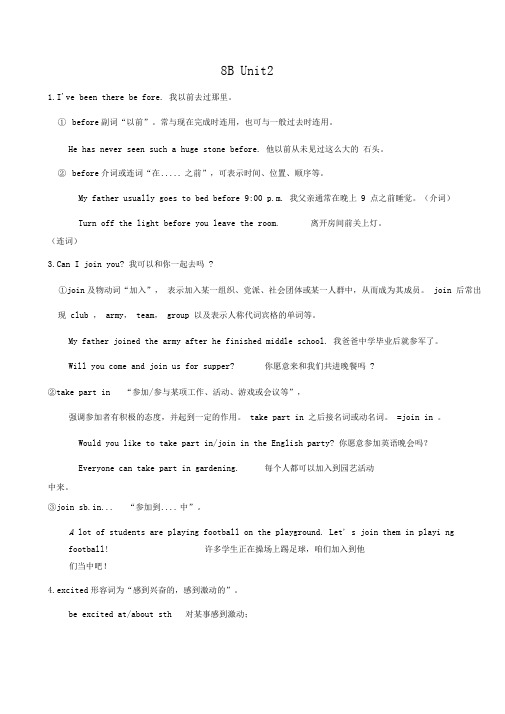
8B Unit21.I've been there be fore. 我以前去过那里。
①before副词“以前”。
常与现在完成时连用,也可与一般过去时连用。
He has never seen such a huge stone before. 他以前从未见过这么大的石头。
②before介词或连词“在..... 之前”,可表示时间、位置、顺序等。
My father usually goes to bed before 9:00 p.m. 我父亲通常在晚上9 点之前睡觉。
(介词)Turn off the light before you leave the room. 离开房间前关上灯。
(连词)3.Can I join you? 我可以和你一起去吗?①join及物动词“加入”,表示加入某一组织、党派、社会团体或某一人群中,从而成为其成员。
join 后常出现club ,army,team,group 以及表示人称代词宾格的单词等。
My father joined the army after he finished middle school. 我爸爸中学毕业后就参军了。
Will you come and join us for supper? 你愿意来和我们共进晚餐吗?②take part in “参加/参与某项工作、活动、游戏或会议等”,强调参加者有积极的态度,并起到一定的作用。
take part in 之后接名词或动名词。
=join in 。
Would you like to take part in/join in the English party? 你愿意参加英语晚会吗?Everyone can take part in gardening. 每个人都可以加入到园艺活动中来。
③join sb.in... “参加到.... 中”。
A lot of students are playing football on the playground. Let' s join them in playi ngfootball! 许多学生正在操场上踢足球,咱们加入到他们当中吧!4.excited形容词为“感到兴奋的,感到激动的”。
译林牛津八年级下册 8B知识点梳理
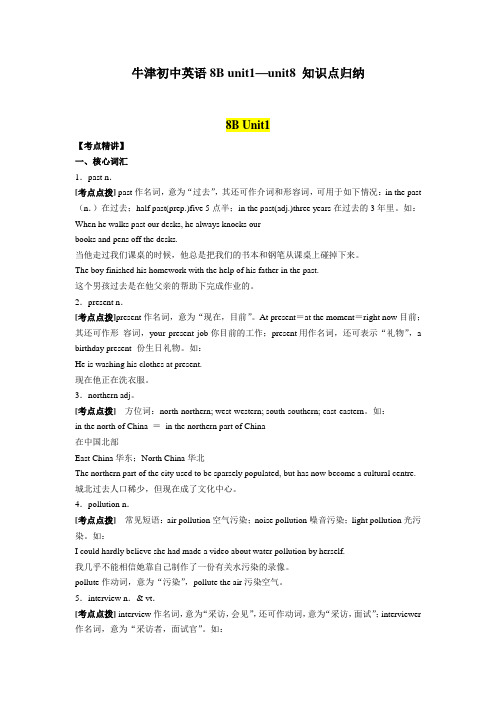
牛津初中英语8B unit1—unit8 知识点归纳8B Unit1【考点精讲】一、核心词汇1.past n.[考点点拨] past作名词,意为“过去”,其还可作介词和形容词,可用于如下情况:in the past (n.)在过去;half past(prep.)five 5点半;in the past(adj.)three years在过去的3年里。
如:When he walks past our desks, he always knocks ourbooks and pens off the desks.当他走过我们课桌的时候,他总是把我们的书本和钢笔从课桌上碰掉下来。
The boy finished his homework with the help of his father in the past.这个男孩过去是在他父亲的帮助下完成作业的。
2.present n.[考点点拨]present作名词,意为“现在,目前”。
At present=at the moment=right now目前;其还可作形容词,your present job你目前的工作;present用作名词,还可表示“礼物”,a birthday present -份生日礼物。
如:He is washing his clothes at present.现在他正在洗衣服。
3.northern adj。
[考点点拨] 方位词:north-northern; west-western; south-southern; east-eastern。
如:in the north of China =in the northern part of China在中国北部East China华东;North China华北The northern part of the city used to be sparsely populated, but has now become a cultural centre. 城北过去人口稀少,但现在成了文化中心。
译林牛津八年级下册 8B知识点梳理
牛津初中英语8B unit1—unit8 知识点归纳8B Unit1【考点精讲】一、核心词汇1.past n.[考点点拨]past作名词,意为“过去”,其还可作介词和形容词,可用于如下情况:in the past(n.)在过去;half past(prep.)five 5点半;in the past(adj.)three years在过去的3年里。
如:When he walks past our desks, he always knocks ourbooks and pens off the desks.当他走过我们课桌的时候,他总是把我们的书本和钢笔从课桌上碰掉下来。
The boy finished his homework with the help of his father in the past.这个男孩过去是在他父亲的帮助下完成作业的。
2.present n.[考点点拨]present作名词,意为“现在,目前”。
At present=at the moment=right now 目前;其还可作形容词,your present job你目前的工作;present用作名词,还可表示“礼物”,a birthday present -份生日礼物。
如:He is washing his clothes at present.现在他正在洗衣服。
3.northern adj。
[考点点拨] 方位词:north-northern; west-western; south-southern; east-eastern。
如:in the north of China = in the northern part of China在中国北部East China华东;North China华北The northern part of the city used to be sparsely populated, but has now bee a cultural centre.城北过去人口稀少,但现在成了文化中心。
牛津译林版八年级英语下册8B Unit2 考点语法复习归纳
8B Unit2 考点复习归纳一、核心词汇1.fantastic adj.[考点点拨]意为“极好的,美妙的”。
a fantastic beach一片极好的海滩;a fantastic achievement 一项了不起的成就;have a fantastic time=have a good/great/wonderful time玩得开心。
fantasy n.(pl. fantasies)幻想,想象。
如:Stop living in a fantasy world别再生活在幻想世界中了。
2.such det.& pron.[考点点拨] such意为“这样的(人或物)”,常用于以下结构:such+a/an+adj.+可数名词单数。
如:This is such a big house.这是一座如此大的房子。
such+adj.+可数名词复数。
如:They are such kind girls.她们是如此好心的女孩。
such+adj.+不可数名词。
如:It is such sad music.它是如此悲伤的音乐。
[辨析] so常用于以下结构:so+adj.+a/an+可数名词单数。
如:so clever a boy如此聪明的一个男孩so+adj./adv.。
如:so clever如此聪明;so quickly如此迅速so many/much/few/little+n.。
如:so many mistakes如此多的错误3.couple n.[考点点拨]意为“两人,两件事物,几个人”。
a coupleof…一对,几个,几件。
如:I saw a couple of men get out我看见有两个男人出去了。
We went there a couple of years ago.我们几年前去过那儿。
二、核心句型1.I don't think it'll be a holiday for me.我想这对我来说不会是个假期了。
译林牛津八年级下册8b知识点梳理
译林牛津八年级下册8B知识点梳理(共37页)--本页仅作为文档封面,使用时请直接删除即可----内页可以根据需求调整合适字体及大小--牛津初中英语8B unit1—unit8 知识点归纳8B Unit1【考点精讲】一、核心词汇1.past n.[考点点拨] past作名词,意为“过去”,其还可作介词和形容词,可用于如下情况:in the past(n.)在过去;half past(prep.)five 5点半;in thepast(adj.)three years在过去的3年里。
如:When he walks past our desks, he always knocks ourbooks and pens off the desks.当他走过我们课桌的时候,他总是把我们的书本和钢笔从课桌上碰掉下来。
The boy finished his homework with the help of his father in the past.这个男孩过去是在他父亲的帮助下完成作业的。
2.present n.[考点点拨]present作名词,意为“现在,目前”。
At present=at the moment=right now目前;其还可作形容词,your present job你目前的工作;present用作名词,还可表示“礼物”,a birthday present -份生日礼物。
如:He is washing his clothes at present.现在他正在洗衣服。
3.northern adj。
[考点点拨] 方位词:north-northern; west-western; south-southern; east-eastern。
如:in the north of China = in the northern part of China在中国北部East China华东;North China华北The northern part of the city used to be sparsely populated, but has now become a cultural centre.城北过去人口稀少,但现在成了文化中心。
译林牛津八年级下册 8B知识点梳理---精品管理资料
牛津初中英语8B unit1-unit8 知识点归纳8B Unit1【考点精讲】一、核心词汇1.past n.[考点点拨]past作名词,意为“过去”,其还可作介词和形容词,可用于如下情况:in the past (n.)在过去;half past(prep.)five 5点半;in the past(adj。
)three years在过去的3年里。
如:When he walks past our desks,he always knocks ourbooks and pens off the desks.当他走过我们课桌的时候,他总是把我们的书本和钢笔从课桌上碰掉下来。
The boy finished his homework with the help of his father in the past.这个男孩过去是在他父亲的帮助下完成作业的。
2.present n.[考点点拨]present作名词,意为“现在,目前"。
At present=at the moment=right now目前;其还可作形容词,your present job你目前的工作;present用作名词,还可表示“礼物",a birthday present —份生日礼物。
如:He is washing his clothes at present.现在他正在洗衣服。
3.northern adj.[考点点拨]方位词:north-northern;west-western; south-southern; east-eastern。
如:in the north of China =in the northern part of China在中国北部East China华东;North China华北The northern part of the city used to be sparsely populated, but has now become a cultural centre。
- 1、下载文档前请自行甄别文档内容的完整性,平台不提供额外的编辑、内容补充、找答案等附加服务。
- 2、"仅部分预览"的文档,不可在线预览部分如存在完整性等问题,可反馈申请退款(可完整预览的文档不适用该条件!)。
- 3、如文档侵犯您的权益,请联系客服反馈,我们会尽快为您处理(人工客服工作时间:9:00-18:30)。
牛津译林版8B语法知识点汇总Unit 1词组:1 和…玩play with sb2 不再…not…any more3 不同时期的交通工具transport at different ti mes4 阳光镇的变化the changes to Sunshine Town5 非常了解这个地方know the place well6 从那时起since then7 自从2005年以来since 20058 自从去年以来since last year9 自从三个星期前以来since three weeks ago10 搬家move house11 搬到南京move to Nanjing12 搬进一座新公寓move to/ into a new fla t13 在…南部in the southern part of14 结婚get married15 和某人结婚be/ get married to sb/ marry sb16 变化很大change a lot17 在过去in the past18 在现在at present19 这些年以来over/ during the years 20 把…变成…turn…into…21 在周末at weekends22 打牌play cards23 下中国象棋play Chinese chess24 愉快的假期pleasant holiday25 玩得很开心have a pleasant time26 水污染water pollution27 噪音污染noise pollution28 过去经常做某事used to do sth29 像以前一样经常地…as often as before 30 把…排进/ 倒进…dump…into…31 一个很严重的问题a very serious problem32 采取行动做某事take action to do sth 33 减少污染reduce the pollution34 在某种程度上in some ways35 顺便问一下by the way36 在去…的路上on the way to…37 挡路in the way38 开阔的空间/ 户外活动场所open space39 不时地,偶尔from time to time40 从…搬出去move out of…41 事实上,实际上in fact42 一处自然景点地方a place of natural beaut y43 一个新的火车站a new railway station44从…借…borrow sth from sb 45借给某人…/把…借给…lend sb sth= lend sth to sb46 例如for example/ such as47 在使用中be in use= be in servic e48 带…去…take sb to …49 一所小学a primary school50 我也是Me, too.51 独自地on one’s own= by onesel f= alone52 空余时间free time53 有同感have the same feeling54 青山环绕green hills around 55 清新的空气fresh air56 良好的环境a good environment57 发展缓慢less development58 离…远be far (away) from59 离…近be close to…60 给…造成许多麻烦cause many problems for…61 近期照片recent photos62 在近几年中in recent years63 …的反义词the opposite of…64 有好运have good luck65 把…扔掉throw sth away66 一个真正的问题a real problem67 写一篇有关阳光镇的文章write an article on Suns hine Town68在过去的一个世纪over the past century69关于北京的过去和现在about Beijing’s past and present70感冒have a cold71 患重感冒have a bad cold 72 受到某人的来信hear from sb= receive a letter from73 乘飞机旅行travel by plane/ by air74 享受阳光和沙滩enjoy the sun and the b each语法:现在完成时(I)我们用现在完成时表示从过去持续到现在的动作或状态,或已完成但对现在有一定影响的活动。
如:He has lived here since he came to Nanjing. 自从来到南京,他就住在这里。
I have lost my mobile phone. 我的手机丢了。
现在完成时常和already、ever、just、never、recently、yet 等副词以及since、for引导的时间状语连用。
如:He has already taken first prize twice.他已经拿过两次一等奖了。
He has not returned the book to me yet. 他还没有把那本书还给我。
He has never visited the Great Wall. 他从没去过长城。
注意:already常用于肯定句,意思是“已经”,而yet常用于否定句和疑问句,意思是“还”。
现在完成时的动词构成:have/ has + 动词的过去分词大多数动词的过去分词变化形式同动词的过去式,可参照动词的过去式变化规则。
不规则动词的过去分词变化:有些动词的过去分词和过去式的变化形式相同,其变化情况大致分类如下:有些动词的过去分词和过去式的变化不同,其变化大致分类如下:Unit 2词组:1 到…作一次旅行go on a trip to…2 一定很有趣must be great fun3 带…出去几天take …out for a few days4 把…带在身边bring sth with sb5 快点;加油come on6 旅游景点tourist attractions7 …的象征a symbol of…8 去滑雪go skiing9 去远足go hiking10 看美丽的风景see the beautiful view11 拍照take photos12 欢迎到…welcome to…13 写信给…write to sb14 玩得很高兴have a fantastic time15 整天the whole day16 乘地铁by underground17 在入口处at the entrance18 高速运行move at high speed19 一家快餐店a fast food restaurant20 对…感兴趣be interested in21 不停地拍照ca't stop taking photos22 迪斯尼人物的游行a parade of Disney c haracters23 下午晚些时候later in the afternoon24 一天中最精彩的部分the best part of the day25 向…挥手致意wave to …26 一路上all the way27 像魔术一样be like magic28 精彩的狮王表演the great 'Lion King' show29 买一些纪念品buy some souvenirs30 在…结束时at the end of…31 观看烟火watch fireworks32 在烟火映衬下看起来很闪亮look shiny and beautiful under the fireworks33 一共,总计in all34 一次刺激的旅行an exciting trip35 把某物给某人看show sth to sb36 一队人a line of people37 排队等候wait in line38 一次有意义的经历a meaningful experienc e39 一次真得令人高兴的假日a really delightful h oliday40 多姿多彩的服饰colourful costumes41 …一名成员a member of…42 到深圳旅游travel to Shengzhen43 全年all year around44 在即将到来的假日in the coming holiday45 依次/轮流做某事take turns to do sth46 计划出国旅游plan to travel abroad47 希望做某事hope to do sth48 希望某人做某事wish sb to do sth49 飞往某地fly to …50 新鲜的空气fresh air51 宜人的天气pleasant weather52 名胜古迹places of interest53 我们去香港旅游的日子the day of our tripto Hongkong54 三个半小时three and a half hours= three hours and a half55 鸟瞰香港的景色have a bird’s-eye view of Hongkong56 一座高楼耸立、夜晚灯光闪烁的现代化城市a modern city of tallb uildings with lights shin ing in the evening57 文化中心cultural centre语法:现在完成时(II)have/ has been和have/ has gone的用法●我们用have/ has been表示某人曾经去过某地,并且已经回来。
如:He has been to the Great Wall twice. 他曾经去过长城两次。
We have never been to the South Hill. 我们还从来没有去过南山。
●我们用have/ has gone表示某人已经去了某地,但还没回来。
如:He has gone to London. He will be back in two weeks.他已经去了伦敦了。
他将在两周后回来。
-Is Tom at home? 汤姆在家吗?-No, he isn’t. He has gone to the cinema. 不在,他去看电影了。
和for或since连用的动词现在完成时常和for或since引导的表示一段时间的时间状语连用。
